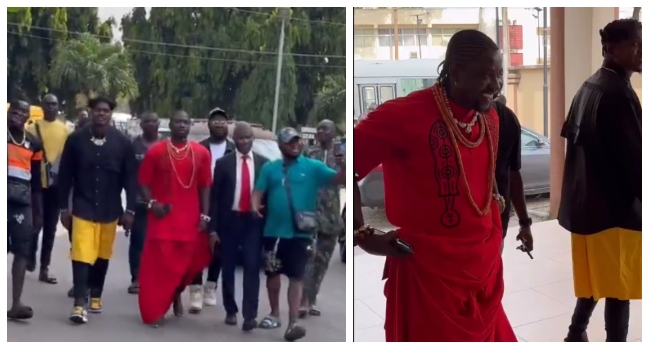Social media influencer Vincent Otse, also known as Very Dark Man (VDM), appeared at the Lagos High Court in Ikeja around 9:30 a.m. for the hearing of a defamation suit filed against him by Senior Advocate of Nigeria (SAN) Femi Falana and his son, Folarin, popularly known as Falz.
VDM arrived in court dressed in red native attire, with fans in tow, cheering him on. However, the Falanas were absent.
The hearing could not proceed as many of the applications submitted by the parties were not yet available in the court file, leading to the adjournment of the case until January 23.
On October 14, Justice Matthias Dawodu ruled on an ex parte application filed by the Falanas for interim and preemptive remedies, affirming their legal right to protection from slander.
The court also ordered VDM to remove a defamatory video he posted on September 24 against the SAN and his son.
Additionally, Justice Dawodu issued an injunction, barring VDM from further releasing, publishing, or circulating any defamatory content against the Falanas on his social media platforms pending the outcome of the case.
The judge also directed that all legal processes related to the case be served on VeryDarkMan through his lawyer, Deji Adeyanju.
The Falanas had taken the defendant to court in separate suits, each seeking N500 million in damages over a video he posted on his social media platforms.
In the video, VDM alleged that the Falanas received N10 million from Idris Okuneye, also known as Bobrisky, to manipulate the course of justice.
In their suits, the father and son contended that the defendant was aware that his statements were unverified and false but chose to publish them anyway, thereby damaging their reputations recklessly.
They further stated that the defamatory video remains active on VDM’s social media platforms, continuing to harm their reputations as long as it stays online.
In response, VDM has filed an application with the court for permission to appeal the ruling. He argued that refusing his application would constitute a miscarriage of justice, as the case raises significant legal issues deserving of further review.
He stated, “A refusal to grant leave may result in the enforcement of a decision that does not reflect a correct application of the law, leading to outcomes that may be detrimental not only to the parties involved but also to the administration of justice as a whole.
“The appellate court’s role in clarifying and, where necessary, correcting trial court decisions is vital in maintaining the integrity of the judicial system.”



